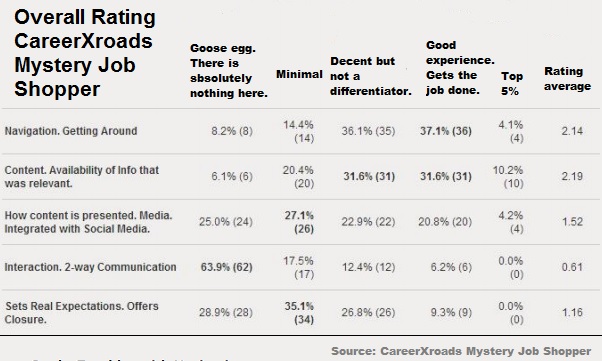If God hadn’t promised Noah to never again flood the Earth again, most of America’s best companies to work for would be moving to higher ground about now.
After 10 years of CareerXroads reports, the launch of the Candidate Experience Awards, and untold conference workshops about the damage the resume black hole does to an employer’s brand, 75 percent of Fortune’s “100 Best Companies to Work For” are still leaving applicants wondering what happened to them.
It’s not getting any better,” agrees Mark Mehler, a principal in the CareerXroads recruitment consultancy. In a survey conducted like mystery shopping, Mehler and his partner, Gerry Crispin, found 75 percent of the 100 have yet to tell job seeker Noah Z. Ark whether he’s even being considered.
Focusing on how companies handle job seekers
Compiled by CareerXroads, the 11th annual Mystery Job Seeker report was released Thursday (Aug. 7). It details the job seeking adventures of one Noah Z. Ark, a fictitious character with a resume crafted to perfectly fit hard-to-fill accounting manager jobs. Not only does Ark have a B.S. in accounting, but his resume showed a Master’s in computer science from MIT.
Such a strong resume did Mehler and Crispin design, that three recruiters called to speak with him, and two companies scheduled him for on-site interviews. As flattering as that might be to the fictional Mr. Ark, it also proved the accuracy of the closing line on his resume, where it was disclosed Ark is not real: “Congratulations if you have read this far as most recruiters will not.”
Six companies, on the other hand, figured out what was going on. Karyn B. Maynard, recruiting director at The Container Store, even sent Ark a personal note, turning him down for the job, but asking him to call her, “If you have spoken to the Almighty and think a flood is coming.”
Funny premise, serious subject
Funny it may be, but the purpose of the Mystery Job Seeker survey is completely serious: “To determine if companies were doing more than saying the right things about how they handle online job seekers.”
The results, as the failure to provide closure demonstrates, are mixed.
“Seventy-seven (77) companies sent Noah a thank you immediately after he applied,” Mehler pointed out. “That means 23 did not.”
In addition to assessing how companies communicate with applicants, a team of recruiter volunteers searched the career sites assessing their ease of navigation, content, difficulty in applying, and other factors.
Just finding their way around on some sites was a challenge. Getting from the company’s home page to its careers site was either impossible or “a test in persistence” for one in five of the sites, according to the report. By a similar proportion, getting to a job was equally difficult. Eight companies got a zero score for their navigation.
Most comments were critical of the experience
When Noah’s helpers got to an appropriate job, 15 percent of the time they weren’t able to apply for it right there. The application process took 10 minutes or less for about half the jobs. Yet, for 46 percent of the applications, the process took longer than 10 minutes, and up to an hour in a couple of rare cases.
“The bulk of (the) subjective comments were critical of (the) experience,” the report notes. “They ranged from a complete inability to complete the application process to smaller glitches that complicated execution.”
A majority of the companies asked for information in addition to a resume, including in some cases a social security number, a personality test, or generic screening questions, though less than a third asked questions relevant to the specific job.
The report offers more detail and more specifics, and in particular comparisons between last year’s mystery job shopper experience and this year’s. It also includes an overall rating for key parts of the process, aggregated from the scores given by the volunteers.
